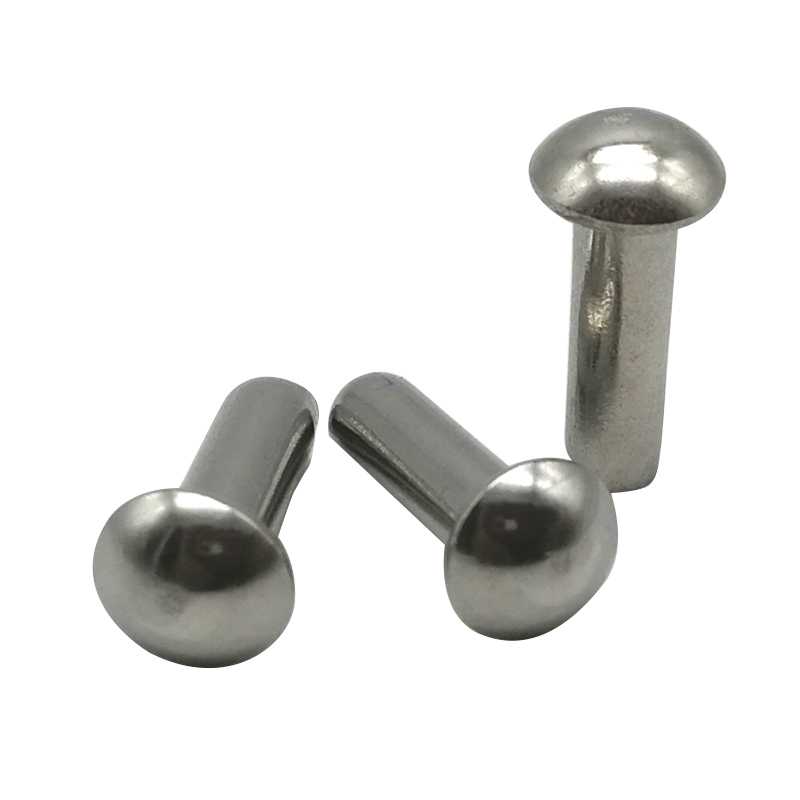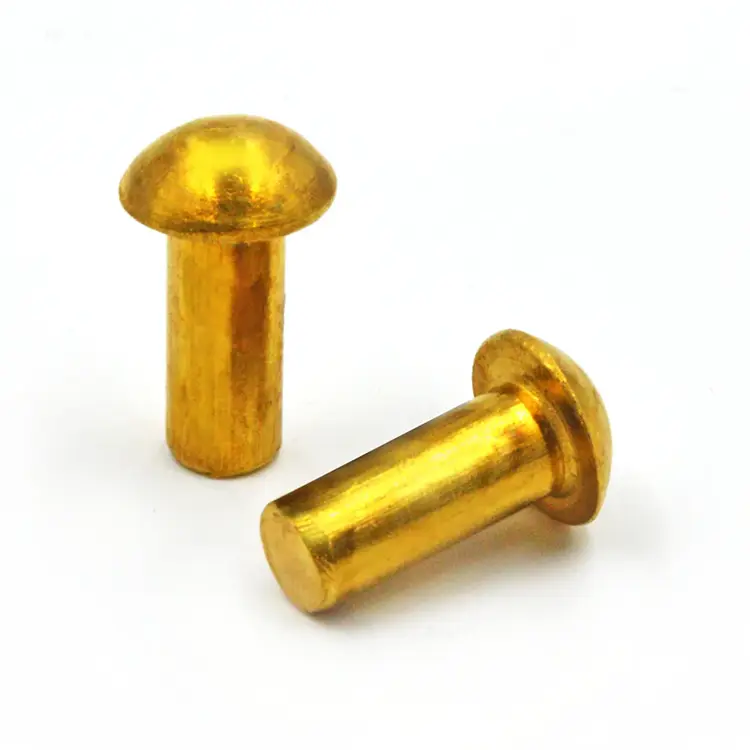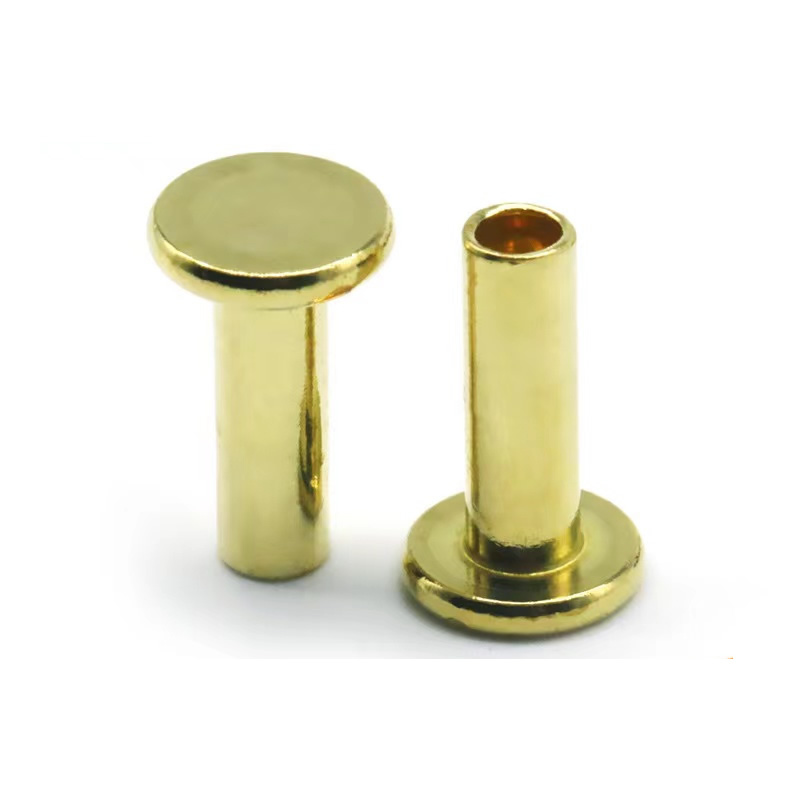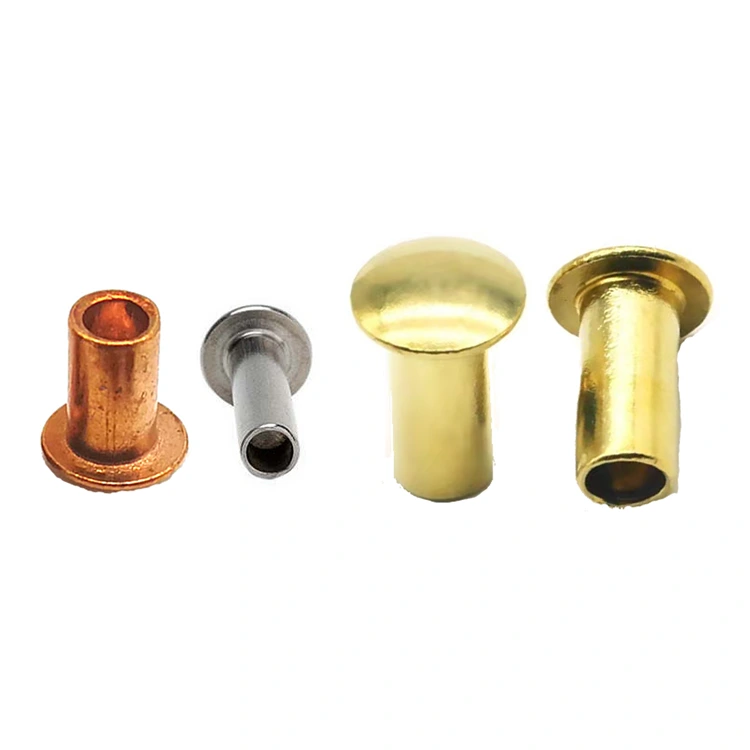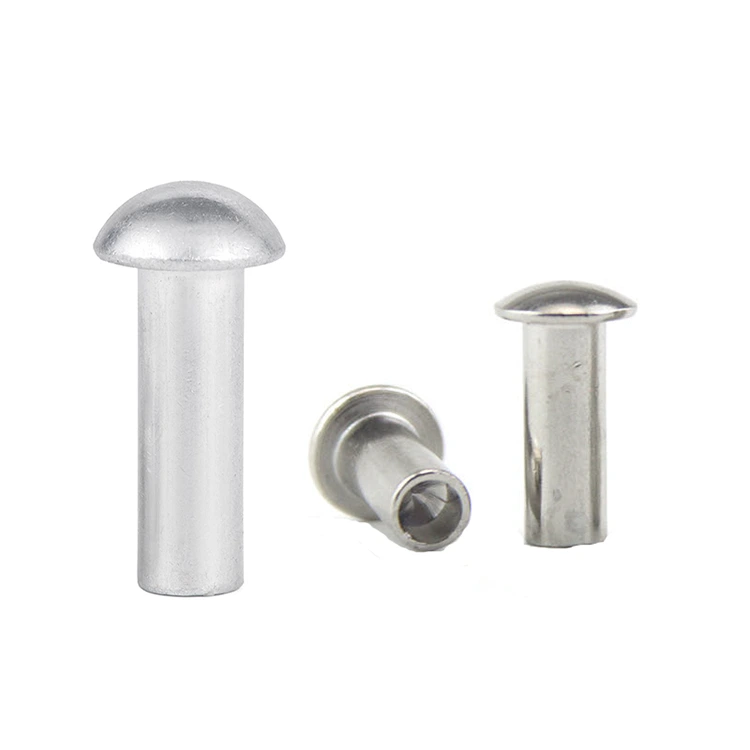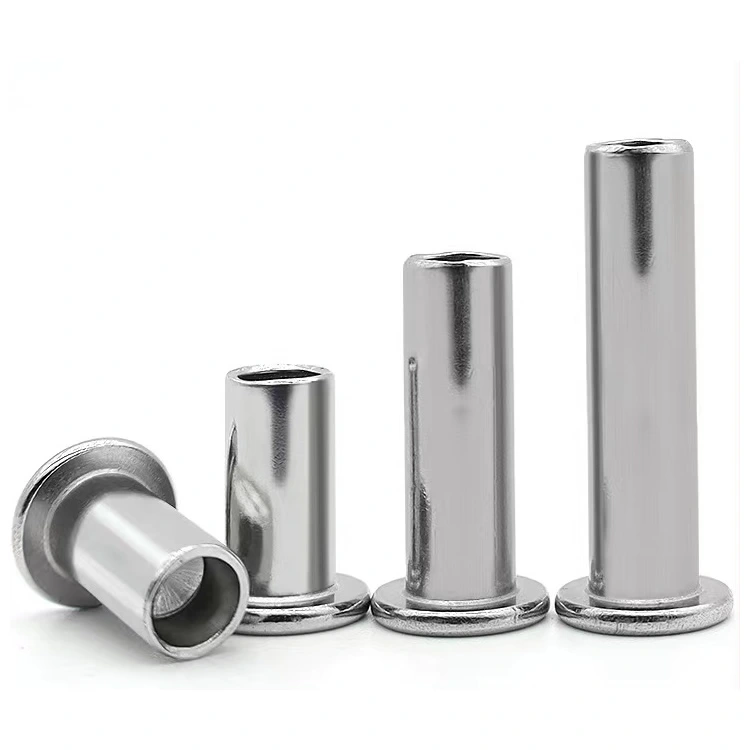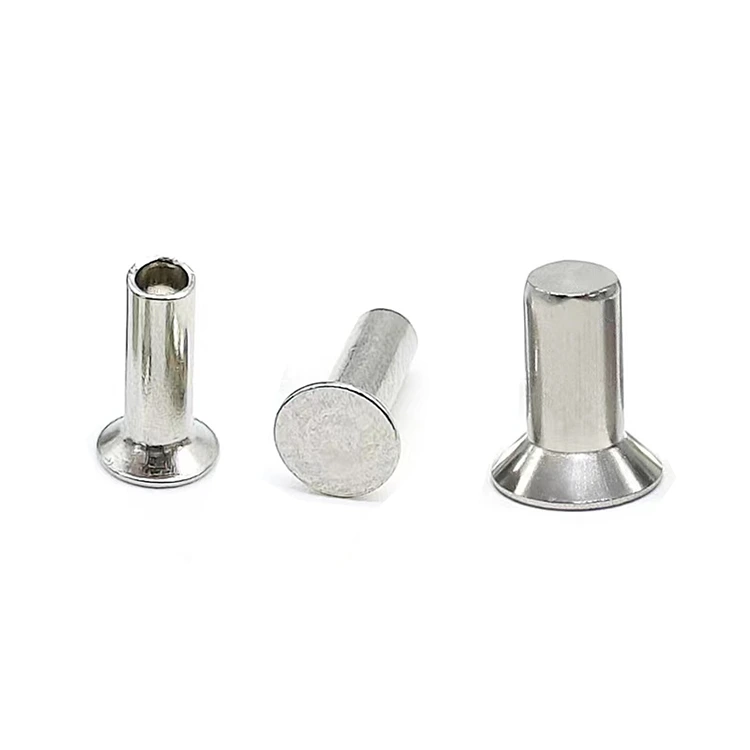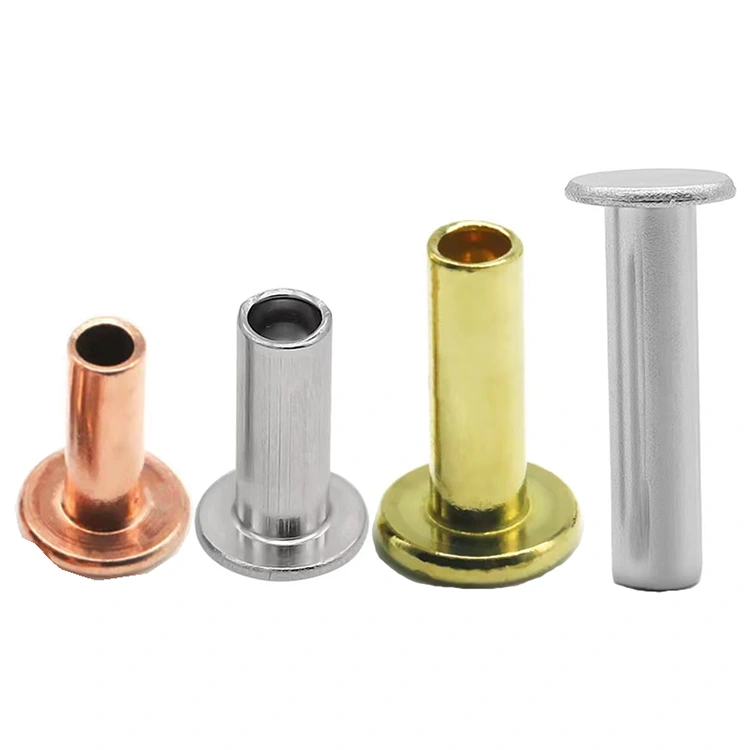Nitar
As one of professional manufacturer in China, Notin would like to provide you Rivets. And we will offer you the best after-sale service and timely delivery.
What is a rivet?
A rivet is a permanent mechanical fastener used to join two or more materials. Rivets work by inserting a metal pin into an aligned hole and deforming the end, creating a strong, secure, and durable connection. Unlike temporary fasteners like screws, rivets do not rely on threads, but instead form a permanent connection, making them ideal for applications requiring high strength, durability, and vibration resistance.
Classification of Rivets
Rivets are typically categorized by head shape, degree of hollowness, or material.
Based on head shape, rivets can be classified as flat head rivets, round head rivets, countersunk head rivets, mushroom head rivets, universal head rivets, truss head rivets, etc.

Based on degree of hollowness, rivets can be classified as solid rivets, semi-tubular rivets, or full tubular rivets.
Based on material, rivets can be classified as brass rivets, stainless steel rivets, steel rivets, aluminum rivets, copper rivets, etc.

What surface finishes are available for rivets?
Rivet surfaces are typically treated with rust-proofing treatments, primarily electroplating, including zinc plating, nickel plating, chrome plating, tin plating, gold plating, and silver plating. Electroplating is a common rust-proofing method for rivets. It applies a layer of plating to the rivet surface through physical or chemical methods. The plating effectively prevents corrosion and rust, while also providing a certain aesthetic effect.
Another special surface treatment method is head coating. Head coating is performed after the rivet is electroplated. This allows for a variety of colors on the rivet head, achieving an aesthetically pleasing finish.
Aluminum rivets cannot be electroplated, but they can be anodized. Anodizing also allows for a variety of color options, but the unit price is higher than electroplating.
Rust-proofing the rivet surface is crucial, effectively extending the rivet's service life and ensuring a secure connection. Different rust-proofing methods are suitable for different environments and applications, so the choice should be tailored to the specific situation.
- View as
Semi ihåliga nitar i mässing
På Nuote Metals fokuserar vi på att tillverka halvhåliga nitar i mässing. Våra nitar använder huvudsakligen H65-mässing - en koppar-zinkblandning som erbjuder utmärkt elektrisk och termisk ledningsförmåga, tillsammans med solid korrosionsbeständighet. Detta material är både tillräckligt hårt och tillräckligt flexibelt för att fungera bra med kallkapning och nitningsprocesser. Dessutom har mässing den naturliga gyllene färgen, så om du använder dessa för dekorativa ändamål behöver du ofta ingen extra plätering.
Läs merSkicka förfråganPan Head Half Hollow Nitar
Har du någonsin undrat hur våra halvhåliga nitar är gjorda? Här är en snabb genomgång:
Först väljer vi ut rätt metalltråd och kapar den till den exakta längden som behövs. Sedan bär det av till den kalla styrmaskinen, som stansar och formar den tråden till den grundläggande nitformen – det är där pannhuvudet och det ihåliga skaftet verkligen tar form. Nästa upp är värmebehandling; vi justerar tiden och temperaturen baserat på materialet för att säkerställa att varje nit har rätt styrka och seghet. Efter det lägger vi ofta till en skyddande finish – tänk galvanisering eller passivering – för att hjälpa dem att bekämpa rost och hålla längre. Och vi hoppar aldrig över den slutliga kontrollen: varje batch granskas för att bekräfta att storlek, finish och prestanda är upp till standarden.
Vi är alltid glada att visa kunder runt – om du någon gång är i området, låt oss bara veta så ordnar vi en rundtur!
Svamphuvud Halv ihåliga nitar
Svamphuvud halvhåliga nitar får sitt namn från deras distinkta kupolformade huvud, som ser ut lite som en svampmössa, kombinerat med ett delvis ihåligt skaft. Denna design låter niten forma sig själv under installationen, vilket skapar ett starkt grepp – perfekt för användningar där du behöver både snyggt utseende och solid prestanda. När den är inställd, böjs den ihåliga änden ut och greppar stadigt, medan huvudet och den övre delen av skaftet förblir solida för extra stöd.
Läs merSkicka förfråganJärn halvtubulära nitar
Halvrörsnitar av järn är mekaniska kopplingar med en ihålig svans. De fungerar genom att klämma ihop den ihåliga delen och flänsa den utåt för att skapa en permanent snäppfixering. Kärnapplikationer är koncentrerade till lätta industrier som kläder, skor och bagage. Deras användning av mjukt trådmaterial undviker sprickbildning vid nitfogar och ger kostnadsfördelar. Nuote Metals är en professionell tillverkare av halvrörsnitar av järn. Våra nitar är av hög kvalitet, och var och en genomgår en noggrann inspektion för att säkerställa kundnöjdhet.
Läs merSkicka förfråganSemi-ihåliga nitar med försänkt huvud
Varför välja halvhåliga nitar med försänkt huvud istället för andra anslutningsmetoder? Detta beror främst på deras unika fördelar. Efter installationen är huvudet i jämnhöjd med ytan, vilket undviker potentiella störningar eller säkerhetsrisker orsakade av utsprång. Den halv-ihåliga designen gör nitprocessen relativt enkel och kräver ingen komplex utrustning; det kan vanligtvis utföras manuellt eller med pneumatiska verktyg. Denna typ av nit är lämplig för material av varierande tjocklek och kan anpassas till olika situationer genom att justera nitkraften.
Läs merSkicka förfråganFlat Head Half Hollow Nitar
Nitning är en vanlig metod för att fästa ihop två eller flera komponenter vid industriell tillverkning och dagligt underhåll. Halv ihåliga nitar med platt huvud är en typ av nit, erbjuder unik design och applikationsfördelar. Nuote Metals är en professionell tillverkare av halvihåliga nitar med platt huvud. Vi finns i Dongguan, Kina, och vi har rikliga ytbehandlingsresurser och bekväma transporter, vilket minskar kostnaden för nitproduktion.
Läs merSkicka förfråganWhat are the advantages of rivets over other fasteners?
1. Ease of Installation
Rivets are fast to install, and even fully automated for high-volume applications, resulting in a simple and efficient operation process.
2. Connection Reliability
The riveting process is standardized, with strict quality control, resulting in highly stable connections. Visual inspection allows for quick verification of connection quality.
3. Vibration and Impact Resistance
Rivets connect through deformation or interference fit, providing strong clamping force and excellent vibration resistance, capable of withstanding vibration and shock.
4. Low Cost
Rivets are easy to install and can be fully automated, saving significant labor costs.
What are the advantages and disadvantages of rivets made of different materials?
Aluminum Rivets
Advantages: Lightweight, reduces overall product weight, low cost, suitable for general civilian applications.
Disadvantages: Low tensile and shear strength, unsuitable for high-strength workpieces, prone to electrochemical corrosion when in contact with metals such as stainless steel.
Stainless Steel Rivets
Advantages: Strong corrosion resistance, high hardness, suitable for high-strength workpieces (such as marine equipment)
Disadvantages: Higher cost, typically more expensive than aluminum rivets of the same specification.
Brass and Copper Rivets
Advantages: Excellent conductivity (such as connecting electronic components), good corrosion resistance.
Disadvantages: Higher cost, more difficult to process.
Steel Rivets
Advantages: High hardness, high connection reliability, and wide applicability.
Disadvantages: Compared to other materials, iron rivets are more prone to rusting.
What are the main applications of rivets?
Rivets have a wide range of uses, from small items like a pair of scissors to large items like airplanes and ships, as well as in high-precision medical applications.
Industrial Manufacturing
Rivets are used in a wide variety of industrial fields, wherever there is a need to connect two or more materials.
Electronics
Rivets secure heat sinks and chips, providing both vibration damping and noise reduction, and are widely used in the cooling systems of electronic products such as computers and mobile phones.
Automotive
Rivets are widely used to connect components of automobile bodies and chassis, such as doors and hoods. Their lightweight and corrosion-resistant properties make them an indispensable joining method in automotive manufacturing.
Aerospace
In aircraft manufacturing, rivets are used to connect different fuselage components, such as wings and tailplanes. Millions of rivets create high-strength, corrosion-resistant joints. Aluminum and titanium alloy rivets are often used to connect components of corresponding materials, ensuring stability in extreme environments.
Rivets are used everywhere. The above examples only represent a small number of their applications. We see rivets everywhere in our daily lives, such as on scissors, folding beds, and strollers etc. Rivets can be customized to different sizes and materials depending on the application.
Nuote Metals has specialized in the rivet industry for over a decade. Our factory is located in Dongguan, a city known as the "World Factory," a city with a developed industry and convenient transportation. This allows us to respond quickly when acquiring raw materials and supporting surface treatments, meeting our customers' needs for quick access to samples and bulk orders. We produce 10 million rivets daily and have molds of various specifications, allowing us to produce rivets as small as 0.8mm and as large as 10mm. We welcome your inquiries and visits.



